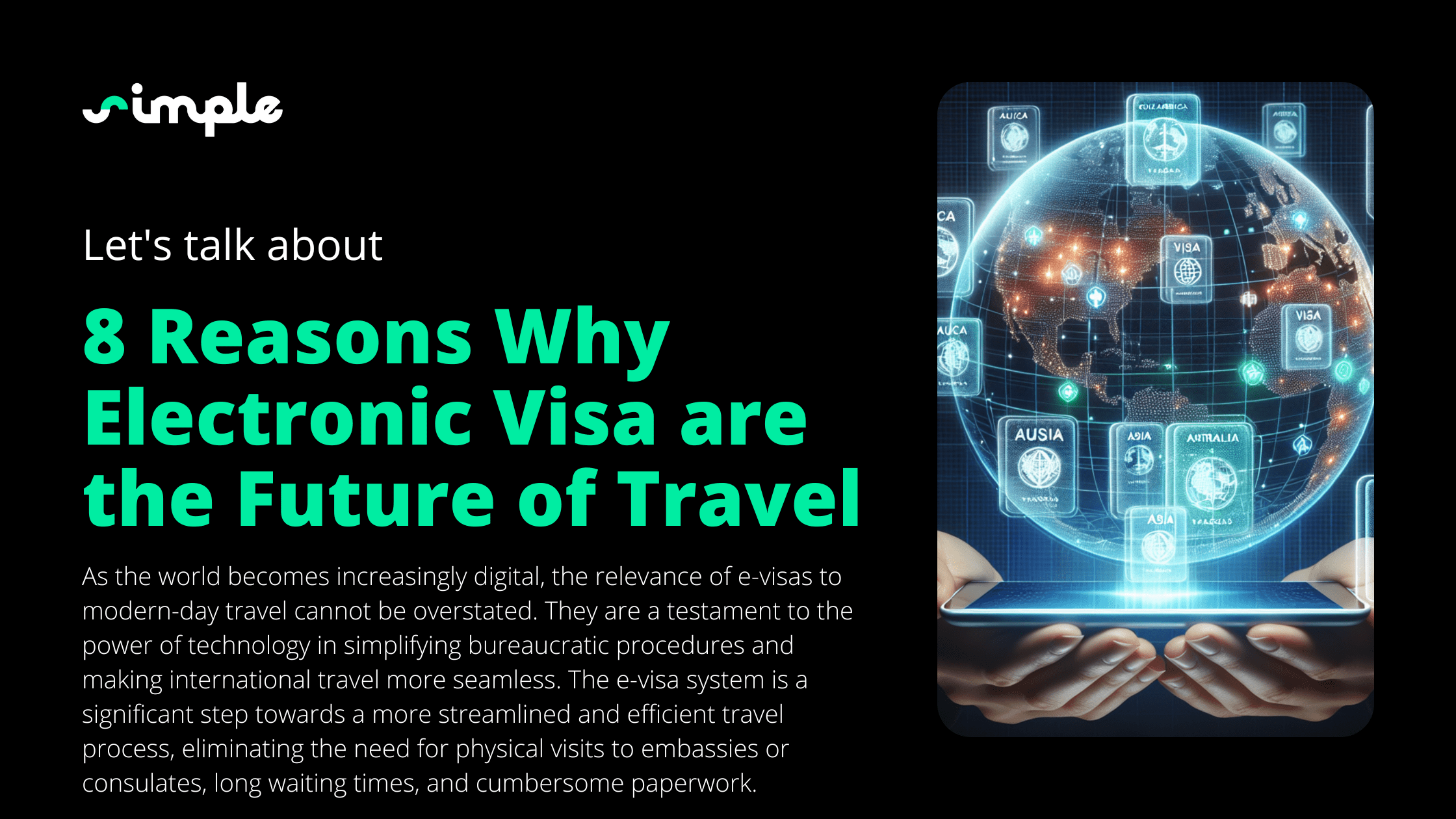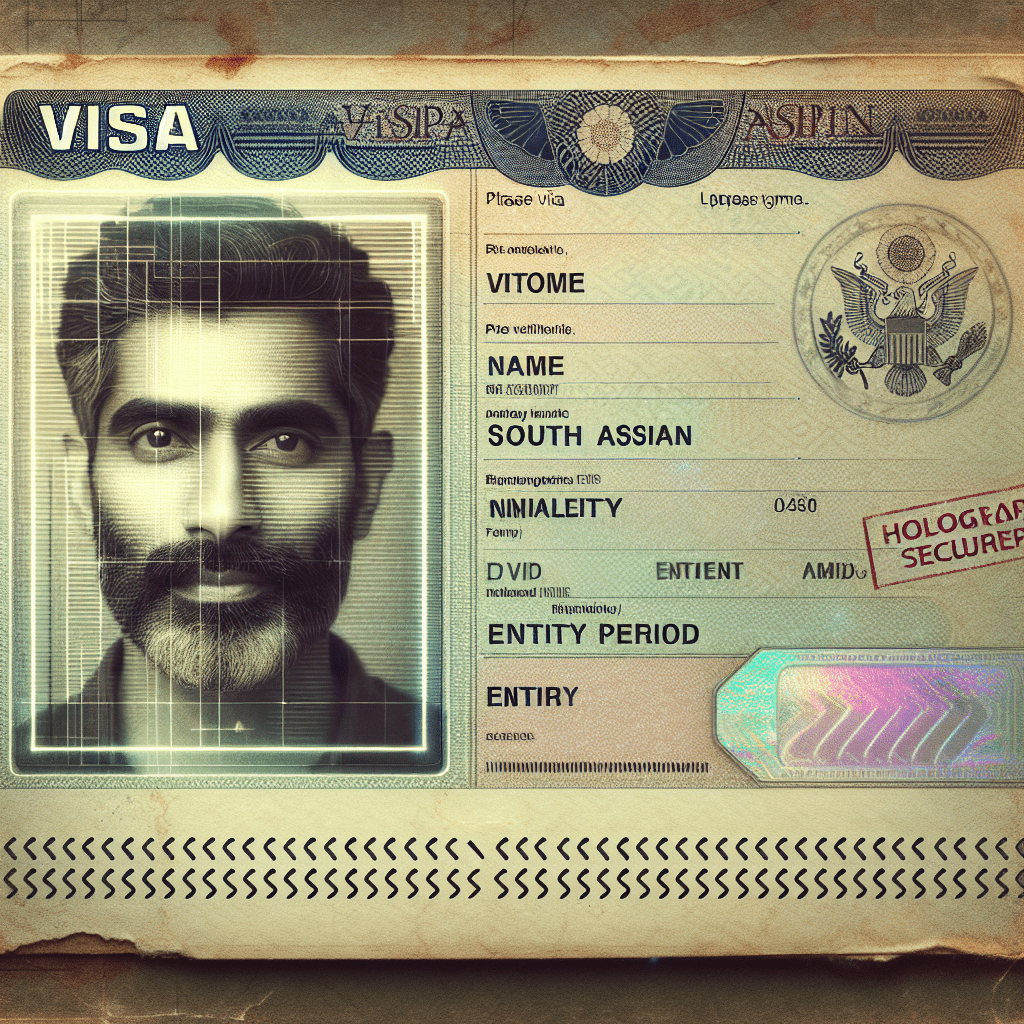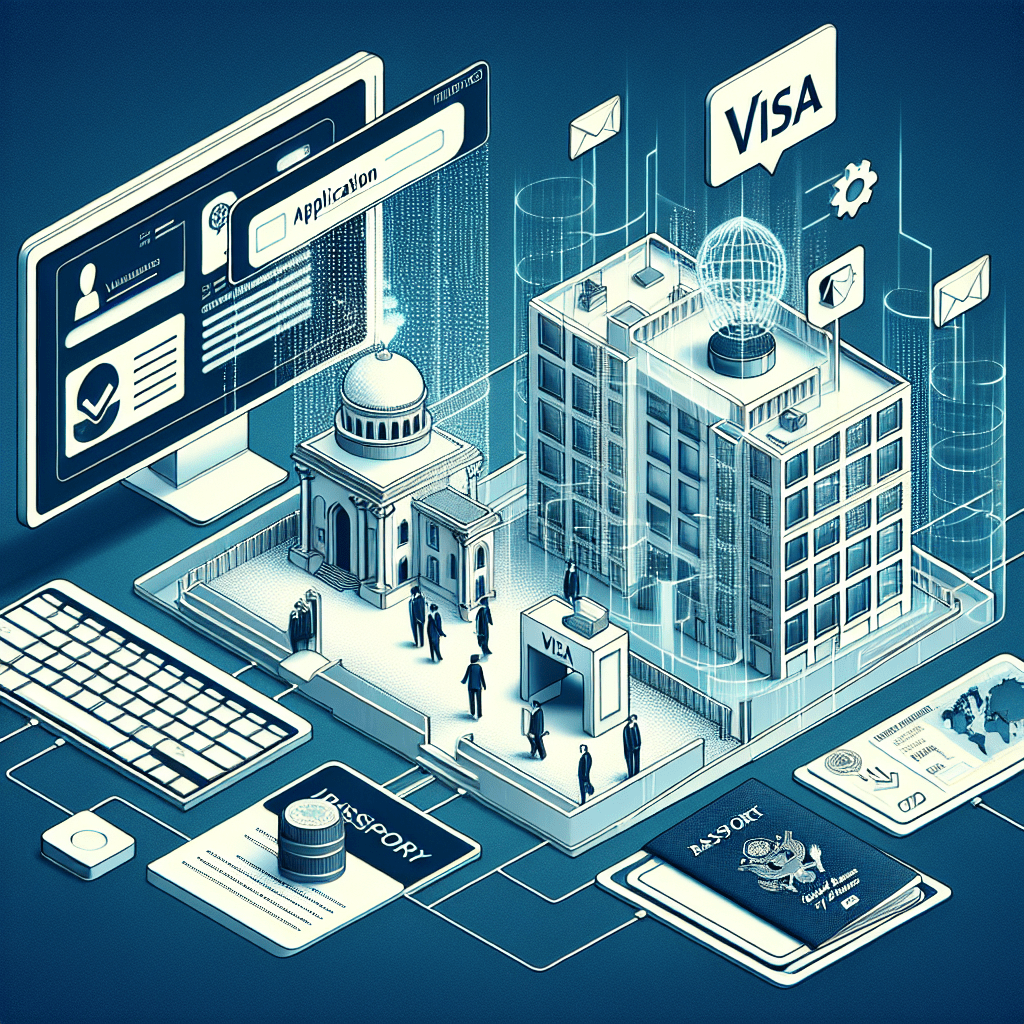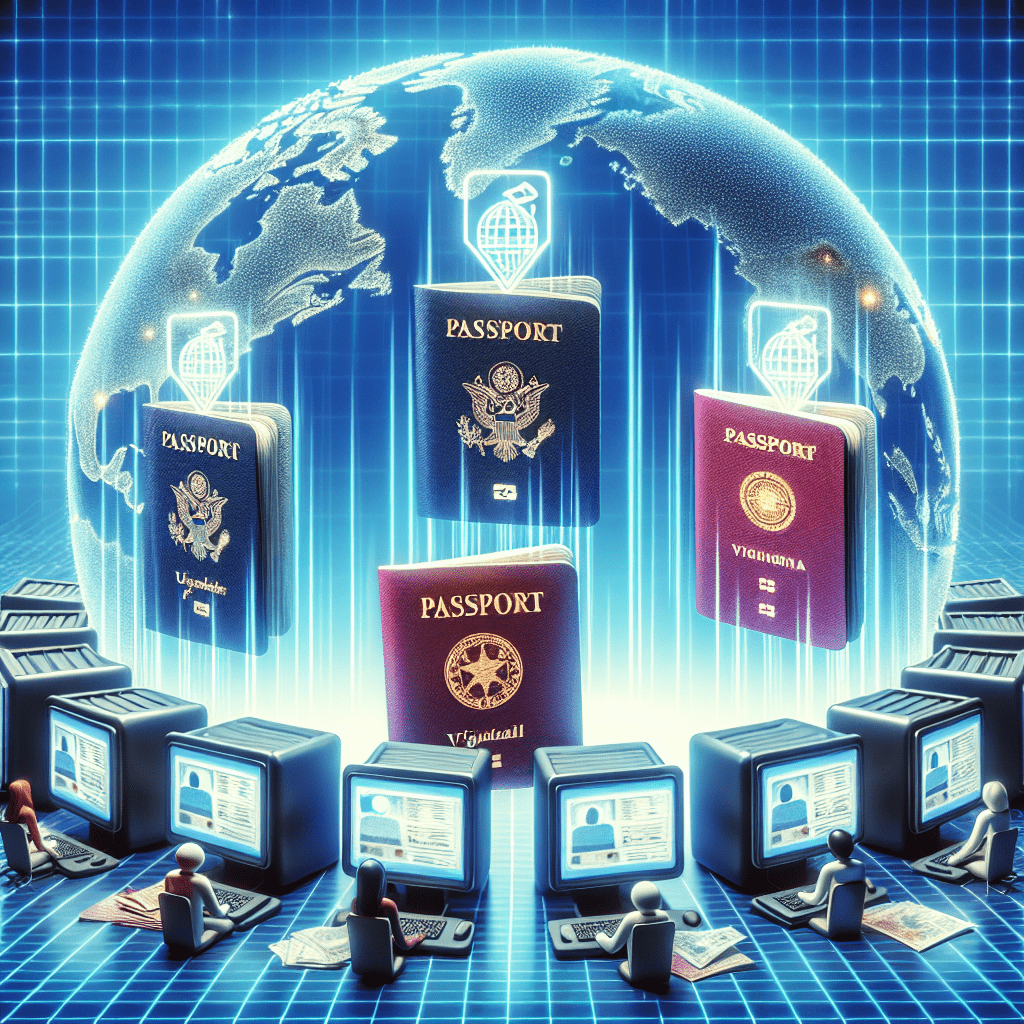8 Reasons Why Electronic Visa are the Future of Travel

Traveling across borders has been revolutionized by the advent of technology, particularly with the introduction of the electronic visa. This digital solution has transformed the traditional paper-based visa process, making it more efficient and accessible. The electronic visa, or e-visa, is a type of travel authorization that is electronically linked to a traveler’s passport. It is a digital counterpart of the conventional visa, but without the need for a stamp or label in the passport.
As the world becomes increasingly digital, the relevance of e-visas to modern-day travel cannot be overstated. They are a testament to the power of technology in simplifying bureaucratic procedures and making international travel more seamless. The e-visa system is a significant step towards a more streamlined and efficient travel process, eliminating the need for physical visits to embassies or consulates, long waiting times, and cumbersome paperwork.
This essay delves into the reasons why electronic visas are poised to become the future of travel. It explores the various advantages of e-visas, from their convenience and efficiency to their potential to boost tourism and international relations. As we navigate through the digital age, it becomes clear that the future of travel lies in solutions like the electronic visa that leverage technology to make our lives easier.

Ease and Convenience
Explanation of the E-Visa Application Process
The online visa application process is a testament to the ease and convenience of e-visas. The simplicity of the online application form is a significant advantage. Applicants can fill out the form at their own pace, without the pressure of completing it in one sitting. The form typically requires basic personal information, travel details, and sometimes, a digital photo. The process is straightforward, with clear instructions provided at each step.
The convenience of applying from anywhere, anytime, is another major benefit. With the electronic visa system, applicants are no longer required to visit an embassy or consulate. They can submit their application from the comfort of their home or office, or even on the go. This flexibility is particularly beneficial for frequent travelers, business people, and those living far from embassies or consulates.
Exploring the Quick Processing Time of E-Visas
One of the most significant advantages of e-visas is their quick processing time. Unlike the traditional visa process, which can take weeks or even months, e-visas are often processed within a few days. Some e-visa services even offer expedited processing for urgent travel needs.
The real-time status monitoring feature is another noteworthy aspect. Applicants can check their electronic visa status online at any time, providing peace of mind and allowing for better travel planning. This is a stark contrast to the physical visa process, where applicants often remain in the dark about their application status until a decision is made.
Discussion on the Electronic Storage and Accessibility
E-visas are stored electronically, which brings several benefits. A permanently stored, easily retrievable visa eliminates the risk of losing a physical visa document. Travelers can access their electronic immigration document anytime they need it, from any device with internet access. This is particularly useful in situations where proof of visa is required, such as at airline check-in or immigration control.
Moreover, the digital storage of visas reduces the risk of damage or loss. Physical visas can get lost, stolen, or damaged, potentially causing significant stress and disruption to travel plans. With e-visas, these risks are virtually eliminated, further highlighting the convenience and security of the digital visa process.

Safety and Security Features
Insight into the Modern, Secure Platform for Information Input
The online visa application process is not just about convenience and speed; it also prioritizes safety and security. The platforms used for information input are modern and secure, designed to protect sensitive information. They employ advanced security measures, including high-level encryption, secure sockets layer (SSL) technology, and firewalls, to ensure that personal and financial information is safe from unauthorized access or cyber threats.
Moreover, these platforms comply with international data protection regulations. They adhere to strict privacy policies, ensuring that personal data is collected, stored, and processed in a lawful, fair, and transparent manner. This commitment to data protection further enhances the security of the e-visa application process, giving applicants peace of mind.
Analysis of the Electronic Authentication and Approval Process
The electronic authentication and approval process is another key aspect of the safety and security of e-visas. High-tech encryption and authentication systems play a crucial role in this process. They ensure that the data transmitted between the applicant and the e-visa system is secure, preventing any potential data breaches.
Inbuilt data verification checks are also an integral part of the process. These checks validate the information provided by the applicant, ensuring its accuracy and authenticity. This not only helps prevent fraudulent applications but also speeds up the approval process, as accurate applications are less likely to require additional review or clarification.
The Superiority of E-Visas Regarding Identity Fraud Prevention
E-visas have a clear edge over traditional visas when it comes to identity fraud prevention. The integration of biometric data is a significant advantage in this regard. Biometric data, such as fingerprints or facial recognition, is unique to each individual, making it extremely difficult to forge or manipulate. This adds an extra layer of security to the e-visa system, making it more robust and reliable.
Furthermore, the digital nature of e-visas reduces the likelihood of visa counterfeiting. Unlike physical visas, which can be tampered with or copied, e-visas are electronically linked to the passport. This makes them virtually impossible to counterfeit, further enhancing their security. In this way, e-visas not only simplify the visa process but also make it safer and more secure.

Nationwide Adoption and Global Acceptance
Highlighting the Widespread Acceptance of E-Visas Worldwide
The acceptance of e-visas is not limited to a few countries or regions; it is a global phenomenon. A growing number of countries are implementing the electronic visa system, recognizing its benefits in terms of efficiency, security, and convenience. From developed nations to emerging economies, the shift towards e-visas is evident across the globe.
The popularity of e-visas among travelers is also on the rise. The ease of the online visa application, the quick processing time, and the security features of e-visas are appealing to travelers of all types – from business travelers and tourists to students and migrant workers. The digital visa process has made international travel more accessible and less daunting, contributing to its growing popularity.
 Focus on the Increasing Country-to-Country Electronic Visa Agreements
Focus on the Increasing Country-to-Country Electronic Visa Agreements
Another significant development is the increasing number of country-to-country electronic visa agreements. These agreements are a testament to the importance of international cooperation for reciprocal e-visa acceptance. They facilitate easier travel between the participating countries, boosting tourism, bus
ness travel, and cultural exchange.
Such agreements also have a positive impact on global commerce. By simplifying the visa process, they encourage business travel and international trade, contributing to economic growth and development. The digital visa submission and online visa approval processes make it easier for businesses to explore new markets, establish international partnerships, and expand their global footprint.
Future Prospects: Advancement Toward a Globally Standardized E-Visa System
Looking ahead, the advancement toward a globally standardized e-visa system seems promising. The potential for a universally recognized e-visa form could revolutionize international travel, making it even more seamless and hassle-free. It could eliminate the need for different visa forms for different countries, simplifying the process for travelers and visa authorities alike.
Such a system could also have a significant impact on global tourism and commerce. By making international travel easier and more accessible, it could boost tourism, foster international relations, and stimulate economic growth. As the world continues to embrace digital solutions, the future of travel indeed lies in innovations like the electronic visa system.

Embracing the Future of Travel with E-Visas
The rise of electronic visas is driven by several key factors. The ease and convenience of the online visa application process, coupled with the quick processing time, make e-visas an attractive option for travelers. The security features of the electronic visa system, including modern, secure platforms for information input and electronic authentication, provide an added layer of protection. The widespread acceptance of e-visas worldwide and the increasing number of country-to-country electronic visa agreements further underscore their growing popularity and relevance.
As we look to the future, the continued development and acceptance of e-visas seem inevitable. The potential for a globally standardized e-visa system could revolutionize international travel, making it even more seamless and accessible. The benefits of e-visas extend beyond individual travelers, impacting global tourism, international relations, and economic growth.
As more countries adopt the electronic visa system and more travelers embrace this digital solution, e-visas are set to become the norm rather than the exception.
Indeed, the future of travel lies in innovations like the electronic visa system. As we continue to navigate through the digital age, embracing these innovations is not just an option; it is a necessity. The shift towards e-visas is a testament to the power of technology in transforming traditional processes, making our lives easier, and bringing the world closer together.